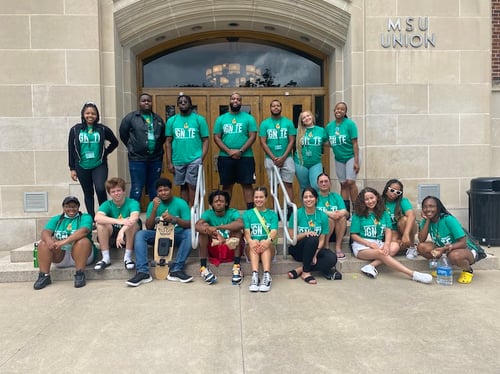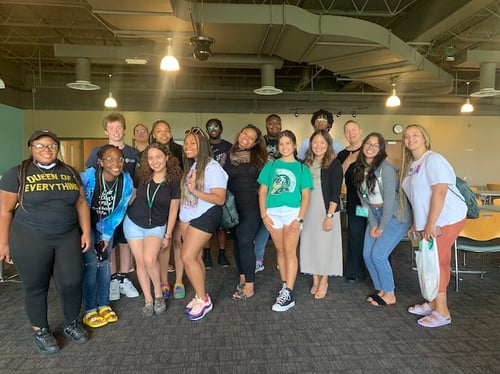 In mid-summer, the MSU College of Communication Arts and Sciences welcomed a group of incoming first-year students from underrepresented communities to campus to help ease the transition from high school to a Big Ten university. The week-long residential bridge program was the first-ever offered by ComArtSci, and was inspired, in part, by the personal experiences of staff within the College’s Office of Diversity, Equity, and Inclusion.
In mid-summer, the MSU College of Communication Arts and Sciences welcomed a group of incoming first-year students from underrepresented communities to campus to help ease the transition from high school to a Big Ten university. The week-long residential bridge program was the first-ever offered by ComArtSci, and was inspired, in part, by the personal experiences of staff within the College’s Office of Diversity, Equity, and Inclusion.
Director Lauren Gaines McKenzie said summer bridge programs like ComArtSci’s Ignite are critical to student success, particularly for first-generation college students from marginalized communities. Gaines McKenzie herself attended bridge programs as an undergraduate. She’s a soon-to-be three-time Spartan alumnus, building on her Bachelor of Arts in psychology (’05) and Master of Arts in counseling (’07) as she works on her Doctorate of Philosophy in higher, adult and lifelong education.
“Bridge programs give incoming students the opportunity to make connections before they get in the classroom,” Gaines McKenzie said. “They make sure students aren’t just dropped off in this massive space and expected to succeed.”
Jada Flowers agreed. She’s the lead program coordinator of Ignite, and was among the core team of administrators, students and faculty organizing the program. Flowers drew on her experience as a first-generation college student from Detroit who earned her bachelor’s in advertising (’20) and master’s in public relations (’21) from the College of Communication Arts and Sciences.
“A lot of us in the DEI office understand that bridge programs are central to who we are and what we’ve achieved,” said Flowers. “We saw the need to have a program that is specific to our college to further strengthen our students' experiences.”
The pandemic effect
The Ignite program began in 2019 with an initial concept to provide a pipeline for underrepresented students in the college’s advertising and public relations area. Plans changed when COVID-19 temporarily restricted student presence on campus and postponed the program to 2021.
At that point, Gaines McKenzie and Flowers did some re-imagining. They knew they had a solid concept, but wanted to expand it beyond advertising and public relations to all core ComArtSci areas including communications, communicative sciences and disorders, journalism, and media and information. They sensed, too, that incoming freshmen would need even more support post-pandemic, since the majority would have spent major portions of their senior year in virtual classrooms, isolated from peers and teachers.
Flowers observed that navigating campus and academic life can be difficult enough for incoming students, and doubly tough for first-generation and underrepresented students who may lack collegiate insights from their families. Add the pandemic experience to the mix, she said, and many students find themselves swirling in a perfect storm that can dampen their pathway to success.
“We saw a window of opportunity and didn’t want to lose it,” said Flowers. “Ignite was an ideal way to help students from diverse backgrounds ease into the college mindset they’ll need to succeed.”
Gaines McKenzie said Ignite can help students feel more connected when they arrive on campus. As of spring semester 2020, anywhere from 18-28% of domestic students within each general academic area of ComArtSci are from historically marginalized groups.
“Programs like Ignite give incoming students the chance to see and meet people who share similar backgrounds like them, and assurances that they can come here knowing there are people and resources who will help them persist,” she said. “It lays the foundation for success coming into college that they might not otherwise have.”
Christa Young was among the incoming freshmen from Flint who attended Ignite alongside students from across Michigan and the U.S. She said being able to ask questions and talk with a panel of current students made college seem real to her, and actually something she could attain.
“Hearing their insights humanized college for me,” said Young, who plans to study journalism. “It allowed me to say ‘OK, this is something I can actually see myself doing, and being here for four years.’”
Finding a comfort zone
Ignite students stayed in Wonders Hall and used it as a starting point to attend classes, seminars and social activities. Professor of Practice Ross Chowles from the Department of Advertising and Public Relations guided students through the process of designing an ad campaign and app. After discussions and brainstorming, the cohort was broken into small groups to focus on market research, development, collateral design and presentation.
Students also took campus and facilities tours, and attended presentations and seminars about university resources and student life. College leadership, faculty and staff joined students for meals and informal conversations about programs and opportunities. At the end of the week, student groups presented their projects to college leadership, faculty and the Ignite team.
“I had a blast working with students,” said Chowles. “After a year of teaching on Zoom, this program recharged my batteries. These students were awesome and a fabulous audience.”
As a final wrap, students shared their thoughts on what it meant to be part of the inaugural cohort. Many said they appreciated learning tips and resources, and added it would have been difficult to find things on their own. Others found peace of mind in meeting new people, making new connections and realizing other people felt how they did. Some said the weeklong program made them more comfortable about living in a new and unfamiliar place.
“Walking around campus was probably one of the biggest things for me,” said Tre Jackson, who plans to study gaming and interactive media. “It was awesome to see all the buildings I might be using and the places I would be. Maybe this will make me a little less lost that first week of class.”
Ignite’s first year was funded through a Creating Inclusive Excellence Grant or CIEG from the MSU Office for Institutional Diversity and Inclusion. Plans are to grow the program for incoming and larger cohorts in coming years. Interested in supporting the program or becoming a mentor? Contact Lauren Gaines McKenzie, director of diversity, equity and inclusion, College of ComArtSci at gainesla@msu.edu.
This story was originally published on the Communication Arts and Sciences website.
